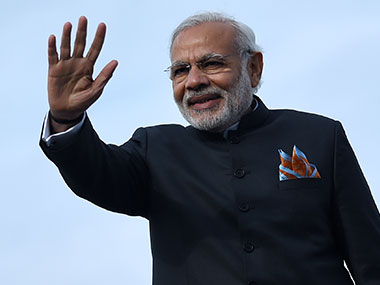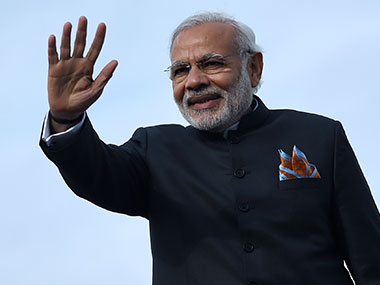In one of his visits to Kazakhstan, Kyrgyzstan, Turkmenistan and Tajikistan of Central Asia, Prime Minister Narendra Modi returned much enlightened about the untapped potential of India’s soft power. He was immensely impressed by the popularity of old Hindi songs sung by most dignitaries he met during his official interaction. “It was simply amazing,” he told accompanying Indian delegates. He was equally amused by the fact that local people of Central Asia, irrespective of their status, are under the thrall of Bollywood music. In the international parlance, particularly in diplomatic circles, the significance of filmi lyrics is often understated. But Modi discussed with his experts on diplomacy and expressed his desire to leverage this untapped source of people to people bonding. In a region threatened by radical Islamisation, the soft power of Indian music and poetry provides a flicker of hope. [caption id=“attachment_2654620” align=“alignleft” width=“380”]
 Narendra Modi. File photo. AFP[/caption] In this context, the realisation that India’s soft power needs to be extended across the globe prompted the government to open up new vistas. Along with the conference of countries from Africa, an event was planned hosting the nations where Buddhism influenced lives. But Central Asia and South Asia feature prominently in the strategic thinking of the government. Modi’s recounting of emotional ties with Afghanistan while addressing its Parliament recently was part of this consistent approach. All these efforts found a resounding echo in the three-day conference known as Raisina Dialogue that began in New Delhi on Tuesday. The conference hosted by the country’s leading think tank, Observer Research Foundation (ORF), jointly with the ministry of External Affairs was represented by delegates from 130-odd nations. Though it has a global elan, the focus on South Asia, Central Asia and its connection with the rest of Asia can hardly be missed. From India’s perspective, the forum offers a unique opportunity to discuss and collaborate on strategic affairs and has all the potential of turning into an Indian version of Shangri-la Dialogue, an annual event hosted by International Institute of Strategic Studies (IISS) in Singapore. Just as the conference began, Sunjoy Joshi, director of the ORF, aptly outlined the purpose of the conference. “For some time now, as the Indian growth story gained momentum, the absence of a truly global platform located in India had been a bit galling,” Joshi pointed out while welcoming the guests including External Affairs Minister Sushma Swaraj, former President of Afghnaistan Hamid Karzai, former President of Sri Lanka Chandrika Kumaratunga, Sychelles ex-President James Machan and Foreign Minister of Bangladesh Mahmood Ali. Hamid Karzai and Kumartunga were unequivocal in their emphasis on India’s greater role in building a peaceful subcontinent. In an oblique reference to those wary of China’s rise as an economic superpower, Kumartunga said that the economic rise of China should be seen as a source of hope and optimism and not fear. Given the volatile history of the region beset by violence, Kumartunga reminded India of the imperative of peace in a region where two powerful nuclear neighbours (India and Pakistan) often remained in an eyeball to eyeball confrontation.
Narendra Modi. File photo. AFP[/caption] In this context, the realisation that India’s soft power needs to be extended across the globe prompted the government to open up new vistas. Along with the conference of countries from Africa, an event was planned hosting the nations where Buddhism influenced lives. But Central Asia and South Asia feature prominently in the strategic thinking of the government. Modi’s recounting of emotional ties with Afghanistan while addressing its Parliament recently was part of this consistent approach. All these efforts found a resounding echo in the three-day conference known as Raisina Dialogue that began in New Delhi on Tuesday. The conference hosted by the country’s leading think tank, Observer Research Foundation (ORF), jointly with the ministry of External Affairs was represented by delegates from 130-odd nations. Though it has a global elan, the focus on South Asia, Central Asia and its connection with the rest of Asia can hardly be missed. From India’s perspective, the forum offers a unique opportunity to discuss and collaborate on strategic affairs and has all the potential of turning into an Indian version of Shangri-la Dialogue, an annual event hosted by International Institute of Strategic Studies (IISS) in Singapore. Just as the conference began, Sunjoy Joshi, director of the ORF, aptly outlined the purpose of the conference. “For some time now, as the Indian growth story gained momentum, the absence of a truly global platform located in India had been a bit galling,” Joshi pointed out while welcoming the guests including External Affairs Minister Sushma Swaraj, former President of Afghnaistan Hamid Karzai, former President of Sri Lanka Chandrika Kumaratunga, Sychelles ex-President James Machan and Foreign Minister of Bangladesh Mahmood Ali. Hamid Karzai and Kumartunga were unequivocal in their emphasis on India’s greater role in building a peaceful subcontinent. In an oblique reference to those wary of China’s rise as an economic superpower, Kumartunga said that the economic rise of China should be seen as a source of hope and optimism and not fear. Given the volatile history of the region beset by violence, Kumartunga reminded India of the imperative of peace in a region where two powerful nuclear neighbours (India and Pakistan) often remained in an eyeball to eyeball confrontation.
#Raisina Dialogue: PM Modi leads India's soft power push to expand global footprint
Ajay Singh
• March 3, 2016, 14:16:00 IST
In one of his visits to Kazakhstan, Kyrgyzstan, Turkmenistan and Tajikistan of Central Asia, Prime Minister Narendra Modi returned much enlightened about the untapped potential of India’s soft power.
Advertisement
)
On the other hand Karzai seemed to be nostalgic when he talked about the possibility of revival of the Silk Route to connect South Asia with the rest of Asia and Europe to make South Asia a prosperous place. He was quite appreciative of Modi’s speech in Afghanistan Parliament and cautioned those who think that Afghanistan could be cast aside in the process of development and growth. His speech expressed disappointment with Pakistan for spurning the friendly gesture of Afghanistan. Sushma Swaraj took note of the concerns expressed by Karzai and Kumartunga and said, “India’s growth is the world’s opportunity”. Apparently, Swaraj referred to India’s growing engagement with South Asia and rest of Asia and said that the increasing footprint of India’s diplomacy is discernible in the manner in which a decisive government has been engaging with the world. The best part of the three-day Raisina dialogue is the coming together of redoubtable strategic thinkers across the world to evolve coherent and compatible strategies to make the world a safer place.
End of Article